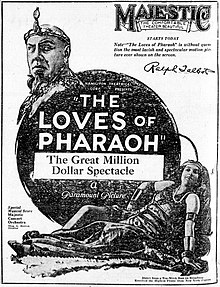The Loves of Pharaoh
| The Loves of Pharaoh | |
|---|---|

A contemporary newspaper advertisement for the American release of the film.
|
|
| Directed by | Ernst Lubitsch |
| Written by |
Norbert Falk Hanns Kräly |
| Starring |
Emil Jannings Paul Biensfeldt Friedrich Kühne Albert Bassermann Harry Liedtke Paul Wegener |
| Music by |
Eduard Künneke (Original) Hugo Riesenfeld (US version) |
| Cinematography |
Alfred Hansen Theodor Sparkuhl |
|
Production
company |
|
|
Release date
|
|
|
Running time
|
110 minutes 100 minutes (restored version) |
| Country | Weimar Republic |
| Language | Silent |
The Loves of Pharaoh (German: Das Weib des Pharao, aka The Wife of the Pharaoh) is a 1922 German historical epic film directed by Ernst Lubitsch. It starred Emil Jannings.
A complete version of the film had been considered lost for years. A digitally restored and reconstructed version premièred on 17 September 2011. The restored film includes the original music by composer Eduard Künneke that had been commissioned for the film by Lubitsch.
Lubitsch is thought to have made The Loves of Pharaoh to show Hollywood that he could make an epic. The Loves of Pharaoh was his last German feature before he migrated to Hollywood in 1923.
The restoration was done by Thomas Bakels of Munich-based Alpha Omega GmbH, the company that did the digital 2001 and 2010 restorations on Fritz Lang's 1927 Metropolis. Bakels spent five years on the digital restoration; the Munich Film Museum did the reconstruction. The complete version of The Loves of Pharaoh had been lost, so restoration had to be done from parts of the film that had been found in various countries. The largest part came from a 35mm tinted nitrate print the German Federal Archives had acquired from a film archive in Russia in the 1970s. The Russian footage lasted only 55 minutes and was missing all the scenes dealing with love and emotion. This version revolved around the massive combat sequences. The restoration extended the Russian version with footage from an Italian nitrate print of Pharaoh that the George Eastman House in Rochester, New York, had acquired in 1998. The Italian print had been fragmented but contained the missing love scenes. To this was added other footage, and the title cards, which had turned up during the Munich Film Museum's restoration work on another movie. According to the introduction of the restoration, about 600 metres (2,000 ft) of the original 2,976 metres (9,764 ft) of film is still missing.
...
Wikipedia
